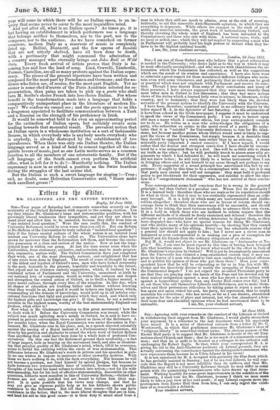rttttra ta thr Mtn.
Mn. GLA.DSTONE AND THE OXFORD REFORMERS. Rugby, 2d Tune 1852. Sus—Your paper of Saturday last comments somewhat severely on the neutrality of the Oxford Reformers with regard to the coming election. You say they admire Mr. Gladstone's large and statesmanlike qualities, with his growingly liberal tendencies they sympathize, and yet they are about to stand aloof and allow him to be unseated, because they differ from him on "one isolated local question." Were the case really this, the conduct of University Reformers would be even worse than you call it. But can Reform or No-Reform of the Universities be truly called an "isolated local question" ? Only if the future mental culture of the whole nation is an isolated local interest can University Reform be called so. The Universities alone have grown far narrower than the Reformation left them, and become the exclu- aive possession of a class and section of the nation. Now at last the long- delayed hope is within our grasp. At last the time seems come when the Universities, from stationary, exclusive, and sectarian, may be made progres- sive, expansive, nation-wide. The Oxford Commission have just completed their work, one of the most thorough, earnest, and enlightened that has of late years been done in England. The result of years of thought by some of the ablest and loyalest of Oxford's sons, men who have looked reverently to the past, honestly to the present, hopefully and trustfully to the future, that report and its evidence embody suggestions, which, if realized by the combined action of Parliament and the University, unmaimed at birth by our national love of compromise, would so widen the compass and deepen and strengthen the central action of Oxford, as to thrill a higher mental, a purer moral culture, through every fibre of the kingdom. In this day, when all shapes of education are bustling hither and thither without knowing what they would be at, how good it would be to have one high tower, which, commanding all the domain of knowledge, would hold up to all inferior edu- cational functions that light and guidance which they need, and which only the highest gifts and knowledge can give! If this, then, be not a national question in the highest sense, worthy of the best statesmanship England can produce, what other is? Now what is Mr. Gladstone's relation to this great movement ? how haa he dealt with it? Before the University Commission was issued, while the subject was much agitating men's minds in Oxford, he is said to have ex- pressed in private conversation views as liberal as those of the Reformers. A few months later, when the Royal Commission was under discussion in Par- liament, Mr. Gladstone rose in his place, and, in a speech directed ostensibly against the issuing of a Royal instead of a Parliamentary Commission, did more by his position and character to retard the whole work of Oxford Reform than anything that could have been done by a whole host of professed Con- servatives. On this one fact the Reformers ground their neutrality,—a fact 9f large import, both as bearing on the movement itself, and also as illustrat- ing that peculiar quality. of Mr. Gladstone's mind, which, till it be overcome, seems to forbid his entering within the circle of true statesmanship. This difference between Mr. Gladstone's words in private and his speeches in pub- lic no one wishes to impute to insincere or other unworthy motives. With these we have nothing to do, with the facts everything. Not because he will not become a partisan, nor bind himself by special pledges, but because he halts between two ineconcileable lines of conduct, because the expansive thoughts of his head his hand refuses to clench into action,—not for his wide statesmanship, but for his lack of effective statesmanship, discernible in other questions, hitherto most manifest in this of University Reform,—Oxford Re- formers are not only justified but are bound to refuse him their sup- Port. It is quite possible that his views may change, and that he may yet give as vigorous public help as he has hitherto shown public resistance to the Reformers. But till that time comes—till he can have confidence in the better, that is, the more liberal thoughts that are in him, and lend his aid to this good cause—it is their duty to stand aloof from a man in whom they still see much to admire, even at the risk of seeming, indirectly, to aid this miserable Anti-Maynooth agitation, in which they see everything to deprecate. While others are engaged in the clash of party strifes and material interests, the great work of nationalizing Oxford, and thereby elevating the whole mind of England, has been intrusted to the Commissioners and those who side with them. A national cause, truly, and no local or selfish one ; which they will not neglect by supporting a man who in Parliament will probably lend his high powers to thwart what they be- lieve to be the highest national benefit.


























 Previous page
Previous page